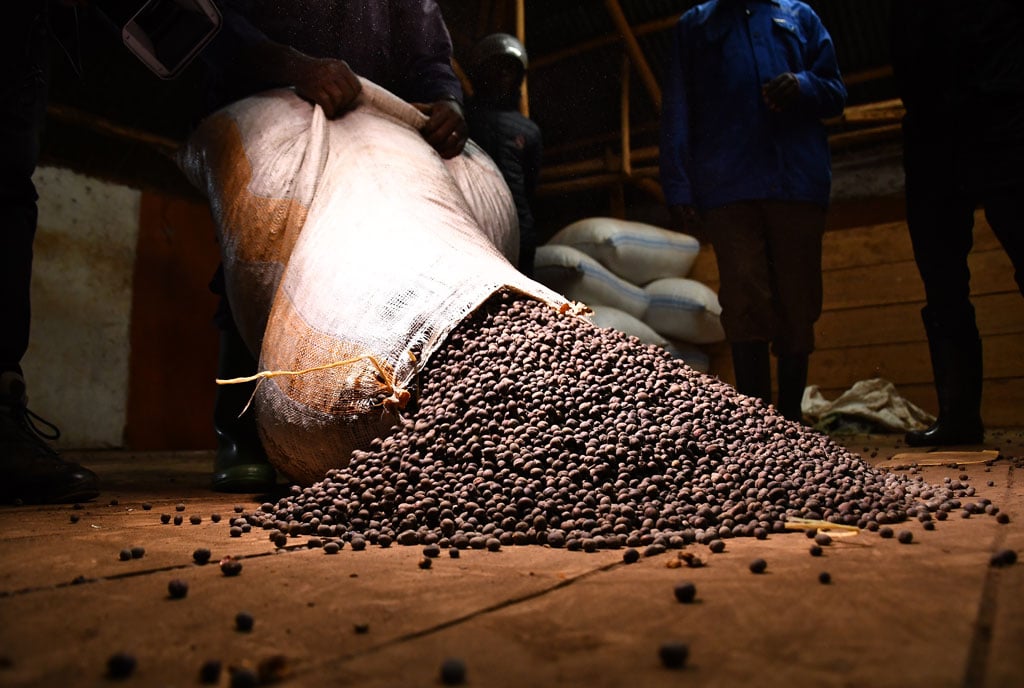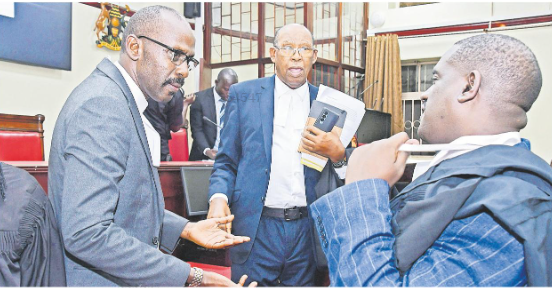
Robusta coffee is seen inside the processing unit of Kasaali Farmers’ Cooperative Society Limited (KACFA) in Kyotera District on May 20, 2024. PHOTO/MICHEAL KAKUMIRIZI
Ugly scenes of chaos, locking up journalists in the basement, and fighting among legislators, dominated as Members of Parliament deliberated on the controversial National Coffee Amendment Bill, 2024.
After close to four hours of scuffles, 305 lawmakers mainly from the ruling National Resistance Movement (NRM) passed the Bill that sealed the fate of the Uganda Coffee Development Authority (UCDA) , ending weeks of chaos.
We reconstruct different Wednesday scenes at the August House and uncover the tricks the government applied to succeed in passing the law.
Delaying MPs in traffic jam
At around 7am, all roads leading to Parliament, including the Parliamentary Avenue, King George IV Way and Siad Barre - both connecting to Parliament from Railways Ground, Kimathi Avenue, which connects to Parliamentary Avenue, Nile Avenue, which to the north belts both Parliament building and Kingdom Kampala, were turned into a one-way from Kintu Road round-about.
Only legislators and people who operate alongside Parliament Avenue with clear identification were allowed to access.
A good number of MPs and some ministers were caught up in traffic-jam by 10am when the plenary started, which forced most of them to abandon their cars and walk or use boda bodas.
Kilak North MP Gilbert Olanya and his Bugiri Municipality counterpart Asuman Basalirwa accused the government of using this tactic of delaying MPs so that the Bill could be passed in their absentia.
Fighting in Parliament
The morning fight where Kilak North MP Anthony Akol beat up his Mityana Municipality counterpart Francis Zaake over a seat worked out for the government because it ignited the entire confusion in the House which culminated in members of the Opposition abandoning the chambers as the Bill was being discussed.
The fight prompted Speaker Anita Among to adjourn the House for 30 minutes and later the suspension of MPs over their conduct, which scattered mostly those opposing the Bill.
Suspension of 12 legislators
When the House resumed from the 30-minute break, Ms Among suspended 12 lawmakers whom she said had broken the rules of the House.
Invoking Rule 90 of the Rules of Procedure, Ms Among suspended the beaten Zaake, his colleague Akol and 10 other MPs including; Shamim Malende (Kampala Woman MP, NUP), Asinansi Nyakato (Hoima City Woman MP, NUP), and Suzan Mugabi (Buvuma Woman MP, NUP).
Others are Isaiah Sasaga (Budadiri East, FDC), Evans Kanyike (Bukoto East, NUP), Charles Tebandeke (Bbale County, NUP), and Aloysius Mukasa (Rubaga South, NUP).
Leader of Opposition in Parliament Joel Ssenyonyi later accused the Speaker of not handling the matter well.
Power blackout and invasion of Parliament
Shortly after the suspension of the 12 legislators, electricity in the chambers suddenly went off and within a few minutes, a group of plain clothed officials stormed Parliament chambers and started picking the suspended members.
Video footage seen by this publication shows the said personnel grabbing Ms Malende and lifting her up as she cries in Luganda language Emwanyi ettusa, literally interpreted as, we are being killed because of coffee.
Kyadondo East MP Muwada Nkunyingi described the developments as unfortunate.
Journalists locked up
The locking up of journalists in the conference hall in the basement was part of the tricks the government applied to have the Bill passed without much resistance.
Legislators started debating the Bill without any camera, because even the live link where the public watch the proceedings from, was cut off. Journalists later declared a boycott on Parliament activities until an explanation was made.
The Parliament director of Communication and Public Affairs, Mr Chris Obore, when contacted said everything that transpired was in the best interest of journalists.
Evacuating reporters to the conference room, he said, was done in response to some MPs who had threatened to cause mayhem, including hurling objects at the Press Gallery.
March out by Opposition
Following the morning chaotic scenes which left their colleague Zaake hospitalised, suspension of members, coupled with what was transpiring during the debate, LoP Ssenyonyi led a team of legislators out of the House. Their exit gave the remaining MPs opportunity to pass the Bill without any resistance.
Even Budadiri West MP Nathan Nandala Mafabi, who remained and tussled out with the more than 300 MPs, could not do much on his own. Me Obore yesterday said it is Parliament police that invaded the chambers.
“Parliament has a fully-fledged police division. I am not sure that they (MPs) know all the police officers attached to Parliament,” he said. He added that only six members were picked during the power blackout, not 12 as claimed.




